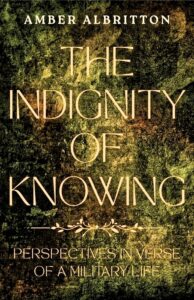
Amber Albritton’s debut collection of poetry, The Indignity of Knowing: Perspectives in Verse of a Military Life, fulfills Robert Frost’s requirement that a poem should grip the reader by the throat, refusing to let go. Albritton’s poems take no prisoners. They’re raw, sensate, fierce—unapologetically so. She ferrets out the shadowy interstices lurking in marriage between elite warriors and wives expected to observe a code as unyielding as the one espoused by their fraternity of husbands.
The indignity imparted by this volume’s title is the discovery that marriage is all too often the first casualty of war:
There are a thousand insecurities that come
with marrying a Special Forces Soldier.

We get scared, lonesome, & sometimes fat
uglier than we were when we were
landing our fella in our thigh-highs,
no undies & done-up nails.
And they sometimes fuck around,
no matter how fine we are, & that
sucks. Sometimes marriages come undone.
But we hang in there.
We hang in when [come what may]
When body parts come up missing
or not working or worse & yes, there’s worse.
Plagued with insecurities and usually considerably younger than their soldier husbands, this sorority of sisters is groomed to suffer in silence and uncertainty as the existential toll on them and their children is finally undeniable. The attendant despair requires a strategy for coping, if little else, as seen in the poet’s titled poem “Enough 2020.”
I think I block out parts of your life, my life, I don’t
like
So much of the in-between-this-space which
is our space
which you once said of us there is none.
And I do know the truth. I guess I do. But
Forgetting is survival.
Denial—waking up each morning.
Albritton’s collection is a dizzying chiaroscuro of deployments, deaths, and memorials occurring with numbing frequency. The only seemingly talk available to Special Forces members and their wives is that of warfare and its instruments of destruction. The poet offers a sample of this type of conversation in “Why Sarin Is Worse Than Bombing: table talk with Daddy.”
I see what you’re saying here.
Atrocities are atrocities.
War crimes are war crimes.
In my mind, however skewed
I think of shooting someone in the head
For an instant kill
much nicer than a lengthy,
unhappy marriage,
or chemical warfare.
Additionally, bombs are better
Than burning flesh
but sometimes cause
burning flesh too &
not just crushed heads
or heavy chests with dusty lungs
and blindness
Or
Traumatic Brain Injuries
From blast concussions.
unless you die quickly
from the dinner wounds.
Then, burning flesh is worse
in death or longing.

That Albritton survives the cognitive dissonance enabling her to honor dead warriors, on the one hand, and to expose the underbelly of a phenomenon composed of equal parts hype and hypocrisy, on the other, is a testament to her ability to withstand extremes. All the mixed feelings, broken hearts, and wounded allegiances are experienced generationally as archetypal patterns. The poet reminds us that she is not only the wife of a career serviceman, but also the daughter of one, in this touching tribute to her parents, but most especially, to her mother: “Colonel’s Cue.”
She wonders how I can love him
My childhood good in my mind
When he put his hands on me
With a man’s discipline
His expectations
With conditional love
I never felt oppressed
Or Alone
Like she does
Because the frog put in early
Doesn’t know it’s boiling
What should she have expected?
When she’s always
Called me by His name?
That I would love him
Our six or seven memories
When she read every night
Was at every game
Attended every moment
When my memories with her
Are too many to decipher
That I would hold him dear
While the getting is good
She often gets her feelings hurt
That he’s my favorite dad
She never once considered
That she’s the favorite mom.
And that of course
I love him always
And anyways because
She did & does & will

The poems in The Indignity of Knowing are about a way of life Albritton had little part in choosing for herself. At the end of the day, she tries to rescue whatever vestige of love that can possibly survive the battlefield of marriage. Whether she succeeds in doing so, I can’t say. What I can attest to is that these lyrics ignite a white-hot flame honoring women forced to acknowledge the bitter truth of the old saying: Dulce et decorum est pro patria mori. (I.e., Sweet and proper it is to die for one’s country.)
Where to find Amber Albritton’s debut poetry collection, The Indignity of Knowing:
Appalachia Bare has been honored to have Amber Albritton as a contributor:
- “Privilege of Witness”
- “Anna Laura Reeve’s Debut Poetry Collection: Reaching the Shore of the Sea of Fertility” Guest Reviewer
**Featured image: Johnny Gunn, perspicacious_esthete – Pixabay




